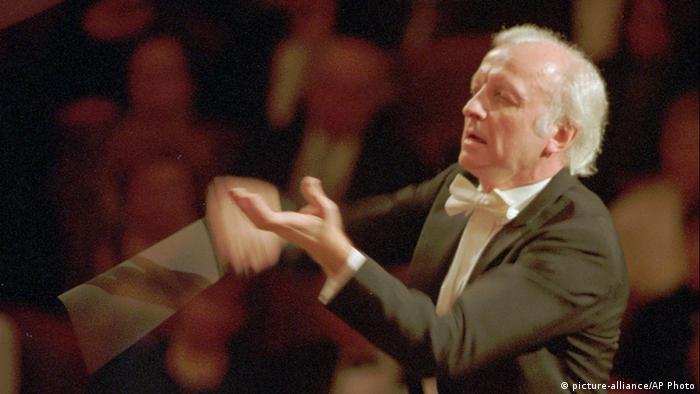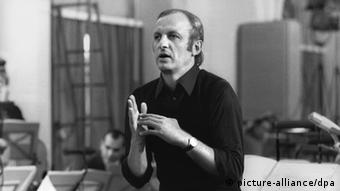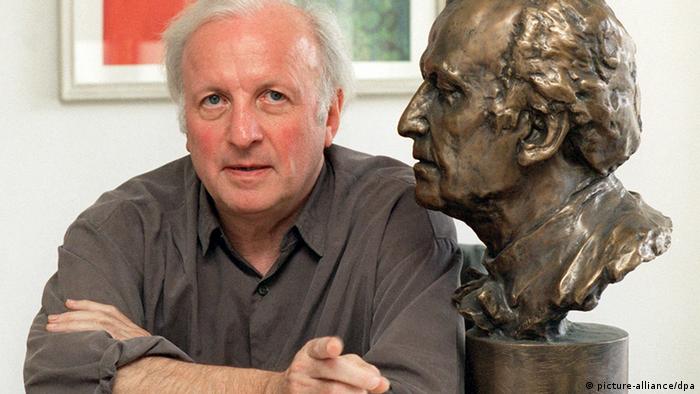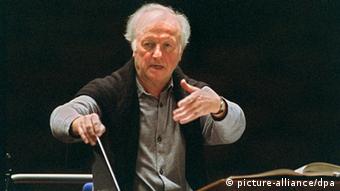70後遼寧丹東出生的張弦,成為BBC有史以來第一位聘任的華裔首席指揮。
http://www.youtube.com/watch?v=V2_XLBSMBlo
M. Ravel Bolero - Philharmoniker Hamburg, Gerd Albrecht (1997)
On the death of Gerd Albrecht
Conductor Gerd Albrecht summed up his two most important concerns as
follows, "Two things are close to my heart: working with young people
and contemporary music."
Gerd Albrecht, born in 1935 in Essen, had the aura of a gentleman and
was one of the most renowned conductors of his generation. After a long
battle with illness, the conductor died on February 2, 2014 in Berlin.
Albrecht was the first foreigner to serve as the principal conductor of the Czech Philharmonic Orchestra. Not only did he conduct countless world premieres, he also revived works by unfairly neglected composers like Alexander Zemlinsky and Franz Schreker. In his TV series presenting classical works to children, he explained works like "The Moldau" or "Peter and the Wolf" to young viewers, earning Germany's prestigious Grimme Prize in 1974.
The conductor also had a reputation for speaking out on political issues. He put his job as head of the Danish Radio Symphony Orchestra on the line in 2004 when he took to the airwaves to denounce US President George W. Bush and the war in Iraq.
First stops
After studying in Kiel and Hamburg, Gerd Albrecht began his career at age 27 as general music director in Lübeck - at the time, the youngest person in Germany in that position. Arguably the most important station in the young conductor's life was his work at the Kassel State Theater from 1966 to 1972. His performances of Bernd Alois Zimmermann's monumental opera, "Die Soldaten" (The Soldiers), and the legendary Wagner "Ring" with director Ulrich Melchinger live on in the city's memory.
In 1988, Albrecht assumed musical directorship of the Hamburg State Opera, leading the performance house to new successes. Together with director general Peter Ruzicka, he put highly-praised new productions on stage, including a staging of Richard Wagner's "Parsifal" under the famed director Robert Wilson, "Der Schatzgräber" (The Treasure Hunter) by Franz Schreker and countless world premieres such as Helmut Lachenmann's "Das Mädchen mit den Schwefelhölzern" (The Little Match Girl).
A man of extremes
It was considered a political sensation when Gerd Albrecht was named head of the Czech Philharmonic Orchestra in 1991. During a tour in Japan, the orchestra's musicians took part for the first time in a secret and free vote. The outgoing Czech maestro Jiri Belohlavek received 49 votes, while the foreign guest conductor Gerd Albrecht took in 17 more.
"I tried to talk the musicians out of that," recalled Albrecht later. "I said: You all are crazy if you pick - of all people - me, a German. It was clear to me even at the time that it would generate controversy."
Indeed, Gerd Albrecht soon felt resistance. Hardly a day went by that the Czech press didn't publish new reproaches. His sometimes less than diplomatic approach also created unrest in the orchestra. The conductor himself could only give one answer: "With me, there's never lukewarm; it's always hot or cold."
He's a man of extremes, said Albrecht's friend Jirid Grusa, then the Czech ambassador in Germany: "Gerd does something that's not really part of our tradition. He's open and says what he thinks. That makes things complicated at times."
After various controversies, the conductor announced he was stepping down in January 1996.
From the heart
A central part of Gerd Albrecht's work was communicating what music is all about to children and young people.
"If we don't succeed in drawing young people to the concert halls, the musical life as we know it cease to exist very quickly in Germany," he often repeated. Since the 1970s, the maestro hosted special explanatory concerts for children, produced numerous CDs and had his own TV shows. In 1989, he founded a youth music foundation in Hamburg, intended to promote up-and-coming musical talents. He financed the organization personally over the years.
Each year, thousands of school pupils take in the workshops and family concerts that are part of his Sound Museum in Hamburg. A further initiative started by Albrecht brings instruments and music teachers to schools and daycare centers around the country.
"You have to give children the feeling that they are being taken completely seriously, and then they can do everything," Albrecht said of his approach. "Everything that's good: Palestrina, Gesualdo, Heinrich Schütz, Bach, everything. I even did Schönberg's opus 15 for children - it all works. There just has to be the power of conviction behind whoever is doing it, and the power of conviction in the music."
Albrecht was the first foreigner to serve as the principal conductor of the Czech Philharmonic Orchestra. Not only did he conduct countless world premieres, he also revived works by unfairly neglected composers like Alexander Zemlinsky and Franz Schreker. In his TV series presenting classical works to children, he explained works like "The Moldau" or "Peter and the Wolf" to young viewers, earning Germany's prestigious Grimme Prize in 1974.
The conductor also had a reputation for speaking out on political issues. He put his job as head of the Danish Radio Symphony Orchestra on the line in 2004 when he took to the airwaves to denounce US President George W. Bush and the war in Iraq.
First stops
After studying in Kiel and Hamburg, Gerd Albrecht began his career at age 27 as general music director in Lübeck - at the time, the youngest person in Germany in that position. Arguably the most important station in the young conductor's life was his work at the Kassel State Theater from 1966 to 1972. His performances of Bernd Alois Zimmermann's monumental opera, "Die Soldaten" (The Soldiers), and the legendary Wagner "Ring" with director Ulrich Melchinger live on in the city's memory.
In 1988, Albrecht assumed musical directorship of the Hamburg State Opera, leading the performance house to new successes. Together with director general Peter Ruzicka, he put highly-praised new productions on stage, including a staging of Richard Wagner's "Parsifal" under the famed director Robert Wilson, "Der Schatzgräber" (The Treasure Hunter) by Franz Schreker and countless world premieres such as Helmut Lachenmann's "Das Mädchen mit den Schwefelhölzern" (The Little Match Girl).
A man of extremes
It was considered a political sensation when Gerd Albrecht was named head of the Czech Philharmonic Orchestra in 1991. During a tour in Japan, the orchestra's musicians took part for the first time in a secret and free vote. The outgoing Czech maestro Jiri Belohlavek received 49 votes, while the foreign guest conductor Gerd Albrecht took in 17 more.
"I tried to talk the musicians out of that," recalled Albrecht later. "I said: You all are crazy if you pick - of all people - me, a German. It was clear to me even at the time that it would generate controversy."
Indeed, Gerd Albrecht soon felt resistance. Hardly a day went by that the Czech press didn't publish new reproaches. His sometimes less than diplomatic approach also created unrest in the orchestra. The conductor himself could only give one answer: "With me, there's never lukewarm; it's always hot or cold."
He's a man of extremes, said Albrecht's friend Jirid Grusa, then the Czech ambassador in Germany: "Gerd does something that's not really part of our tradition. He's open and says what he thinks. That makes things complicated at times."
After various controversies, the conductor announced he was stepping down in January 1996.
From the heart
A central part of Gerd Albrecht's work was communicating what music is all about to children and young people.
"If we don't succeed in drawing young people to the concert halls, the musical life as we know it cease to exist very quickly in Germany," he often repeated. Since the 1970s, the maestro hosted special explanatory concerts for children, produced numerous CDs and had his own TV shows. In 1989, he founded a youth music foundation in Hamburg, intended to promote up-and-coming musical talents. He financed the organization personally over the years.
Each year, thousands of school pupils take in the workshops and family concerts that are part of his Sound Museum in Hamburg. A further initiative started by Albrecht brings instruments and music teachers to schools and daycare centers around the country.
"You have to give children the feeling that they are being taken completely seriously, and then they can do everything," Albrecht said of his approach. "Everything that's good: Palestrina, Gesualdo, Heinrich Schütz, Bach, everything. I even did Schönberg's opus 15 for children - it all works. There just has to be the power of conviction behind whoever is doing it, and the power of conviction in the music."






沒有留言:
張貼留言